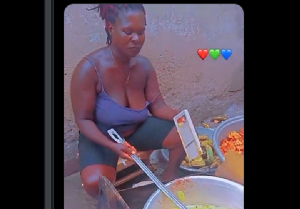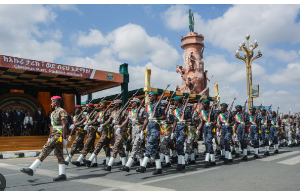The attention of the Ministry of Trade & Industry has been drawn to a number of statements in the public domain, and in the media that show a basic misunderstanding of the exercise that is currently being undertaken by the inter-agency task force led by the Ministry of Trade & Industry to ensure that foreign traders comply with the laws of Ghana.
When the Ministry undertook this exercise it was stated that the Ministry was taking steps to enforce the Ghana Investment Promotion Centre Act, 1994 (Act 478) which made it quite clear that activities that are categorized as petty trading, and small trading businesses were reserved in the act for Ghanaians. It is important to note that the act does not prevent foreigners from trading in Ghana, it however provides for a situation where foreign traders are expected to engage in larger scale trading activities that indeed provide Ghanaian Consumers with wider product choices. However recognizing that petty trading is an area which does not require a large capital outlay in starting a business, it was decided to reserve that as an area of operation for Ghanaians.
Generally speaking therefore in order for a foreigner to undertake trading activities in Ghana he or she must invest at least three hundred thousand united states dollars in their trading activity, they must employ at least ten Ghanaians and they must also not locate their trading activities in the markets, but are at liberty to operate in any commercial area that is not a market. Therefore trading in Makola Market for example is not allowed, but establishing a shop in any commercial area such as locating on the Kojo Thompson Road or on Osu Oxford Street in Accra, for example is allowed.
The Ghana Investment Promotion Centre Act was passed into law in 1994, and at that time even though there were foreign traders operating in the country, they were not doing so on the scale and in the numbers that are present today. Over the last ten years especially as the economy has expanded there have been many more foreign traders who have established in Ghana and though a good number of them have made the effort to comply with the GIPC Act there are a number of them who have not done so. Indeed over the last two days as fifty shops within Makola have been locked, at least half of them have no form of business negotiation whatsoever, let alone compliance with the GIPC Act.
The action taken by the Inter-Agency Task force is to ensure compliance with the GIPC Act, however the Task Force is making some exceptions for ECOWAS citizens in recognition of the ECOWAS Protocol on the right of residence and establishment. Specifically ECOWAS citizens are not being asked to have invested US$300,000.00 neither are they being asked to employ ten Ghanaians in their businesses. They are however expected to meet the same conditions that Ghanaian citizens who start businesses are expected to comply with. This means that they are required to register businesses with the Registrar General’s Department, they are required to register with the Ghana Revenue Authority and pay taxes in the same way as Ghanaians are expected to do, and because they are not our nationals they are expected to properly apply for residential status in Ghana.
Recently the Minister of Trade & Industry – Ms. Hanna Tetteh had the opportunity to meet a delegation from the ECOWAS Parliament, after the Nigerian Union of Traders Association in Ghana petitioned the ECOWAS Parliament informing them that the Government of Ghana was engaged in an action targeted at ECOWAS citizens. The Minister had the opportunity to inform the ECOWAS Parliament that this was not the case and that they had been misinformed, and the Ministry wishes to use this opportunity to restate that this action is not targeted at ECOWAS Citizens, but to bring sanity into the operations of foreign traders activities in Ghana.
We also wish to inform the public that in conducting this exercise the Ministry and inter-agency task force have been very careful to ensure that the affected persons are made aware that this is not an effort to sack them from our country, on the contrary this is an exercise to ensure that they operate legally. Over the last four months the task force engaged the Traders in the markets and informed them about the need to meet the obligations under the act and informed them about what they were required to do. They were also informed that after the four month sensitization period was over the inter-agency Task Force would begin to act to enforce the law, and this is the exercise that is ongoing at the moment. The inter-agency task force has not arrested, any foreign trader, neither have they confiscated any trader’s goods. Further the task force has not seized any traders property, nor have they taken action to have any foreign traders deported.
The task force has however, asked these traders to lock their shops, and have also placed the task force’s padlocks on these shops and has asked all affected traders to report to the Director for Domestic Trade & Distribution of the Ministry, so that working with the inter-agency Task force they will be assisted to properly legalize their operations.
The exercise in respect of requesting ECOWAS Traders to locate in other commercial areas and not the markets has been suspended for one month after the consultations with the ECOWAS Parliamentary delegation. During this period they will also be informed of the actions they need to take to ensure that their business operation in Ghana are legal. The actions that we expect ECOWAS Traders to take, and in which they will be assisted by the Ministry and inter-agency task force are as follows: they should properly register their businesses with the registrar generals department, they should also register with the Ghana revenue authority, and they should obtain valid residence permits. They will be assisted in this exercise by the inter-agency task force and the Ministry of Trade & Industry.
We trust that this publication will clarify the situation for the Ghanaian public and also the Foreign Traders operating within Ghana, and we request their cooperation in ensuring that they can properly and legally establish their business operations in our country. We also request the Media to refrain from using inflammatory language in reporting on this exercise, and not to describe the action taken as “flushing out” foreign traders from Ghana. This is not the case, and we request it should not be characterized as such.
Business News of Friday, 6 July 2012
Source: --












